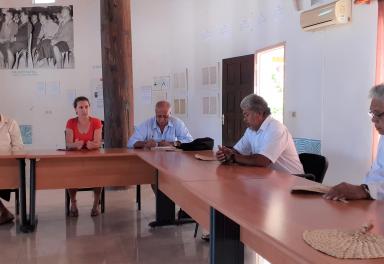Training for culling invasive species in New Caledonia
Following the conference organised by the New Caledonian Wilderness Conservation Agency and its partners at the Pacific Community on 19 September on the strategy and methods of control in New Zealand against invasive mammals that are also present and a priority in New Caledonia, a 15-day training course was organised for 25 candidates from 10 communes on the mainland.
The most remote and difficult-to-access rainforests of the central chain have not yet benefited from any action to combat deer, which are out of control and directly degrade the undergrowth and indirectly the water resource.
The New Caledonian Wilderness Conservation Agency (CEN), in charge of the "Invasive Ungulates" theme of the PROTEGE project, conducted an initial training course on the professional regulation of deer and pigs in areas inaccessible to hunters.
A total of 25 candidates from 10 communes of Grande Terre, more than half of whom are residents of the project's partner tribes, were trained during the first two weeks of September 2022. Their mission will be to regulate deer and fawns to an acceptable level that will allow the restoration of the undergrowth and the water resource.
Over ten modules reviewed:
1) safety,
2) control efficiency,
3) collection of data necessary for management.
The Fédération de la Faune et de la Chasse de Nouvelle-Calédonie (FFCNC), CEN's main service provider, provided training on topography, the use of GPS and communication equipment, safety and the use of weapons, and hunting and/or regulation methods. First aid training was provided by Sauvegarde Formation.
Glen Coulston, a New Zealand professional and trainer, presented the range of regulation techniques deployed over the last few decades and in particular innovative techniques that have increased the effectiveness of regulation operations tenfold, in particular thermal glasses for spotting deer at night and GPS collars for dog auxiliaries. The CEN supervised the organisation and provided training in trapping, the objectives and rules of regulation, and the collection of data and biological material essential to the rational management of deer populations.
The deployment of these first professional control agents, during 5 consecutive days sessions in the forest, is planned over the next two years in the three priority intervention zones identified with the close collaboration of the resident populations, the customary authorities, the managing communities and the Rural Agency, the main donor of these actions, alongside the European Union, donor of the PROTEGE project.
The group of trained candidates.
Photos : CEN NC






